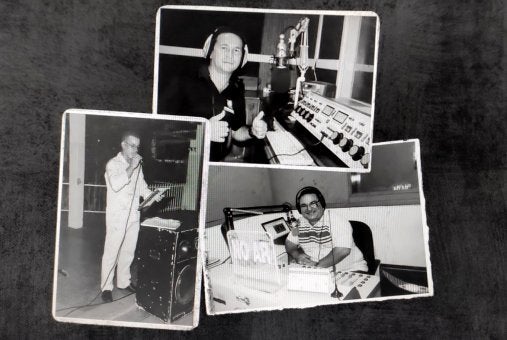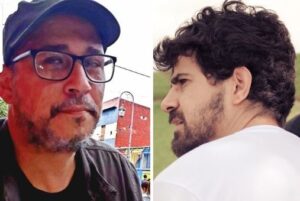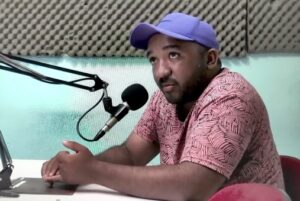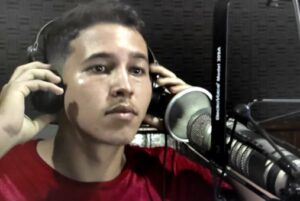Three radio journalists from three cities in the interior of Brazil, the three murdered by gunmen hired by those in charge interested in silencing their critical voices of local power. These stories are interspersed in the Brazilian documentary "Boca Fechada" (Gagged), released on streaming platforms in February, about the murders of journalists who work in cities far from the country's major cities.

Israel Silva, Jairo de Sousa and Gleydson Carvalho. Murdered journalists are the subject of a documentary on violence against journalists in Brazil. (Credit: Boca Fechada/Gagged)
"We found many recurrences within this reality of murdered journalists in Brazil. Many journalists are killed in small towns with the same modus operandi: hired crime, gunshots, gunmen who arrive on motorcycles, machine-gun the person without any chance of defending themselves, and then leave. With so many coincidences, it is possible to find a common denominator for these crimes," journalist Aquiles Lopes, who co-directed the documentary, told Latam Journalism Review (LJR).
Because they happen mostly far from big cities, murders of journalists in Brazil are little known by the general public. The numbers are staggering: there were 64 journalists murdered in Brazil from 1995 to 2018, according to a survey by the National Council of the Public Prosecutor of Brazil quoted in the film. In 2021, Brazil entered the red zone for press freedom, the second-worst category in risk-rating by the non-governmental organization (NGO) Reporters without Borders.
The research began years earlier when Lopes wrote the dissertation "Journalists are executed in Brazil due to their professional practice" during his master's degree in Human Rights at the Federal University of Pernambuco (UFPE Portuguese acronym).

Aquiles Lopes and Marcelo Lordello directed the film and suffered threats during production. (Credit: Courtesy)
"There was an emblematic case in rural Pernambuco, of Jota Cândido, who was shot dead at the door of the radio station in 2005. That somehow got on my radar. It came back to me only when I read a 2016 material from the NGO Artigo 19, which talked about journalists killed in Brazil. I saw that people were studying the subject, with data that proved it was a business as usual, not a bump on the road," Lopes said.
Lopes joined forces with filmmaker Marcelo Lordello to produce the documentary to shed light on this reality. The film reconstructs the murders of journalists Israel Silva, Jairo de Sousa, and Gleydson Carvalho to trace the characteristics of this type of crime in Brazil and identify the features repeated in many of the cases.
"These journalists work mostly in tiny radio stations, minimal facilities, and are part of very small ecosystems, at the root of Brazilian coronelismo [Brazilian rural oligarchies], in which one political group or another controls everything. It controls communications, commerce, the real estate system, the entire sector that delivers, who pays what, where they spend it," Lopes said.
"The patterns [also] repeat themselves when these cases enter the judicial phase. [The film seeks] to understand the involvement of people who commissioned the murders and how little to no justice is served. … We work a lot with the people left behind, and what those traumas are like, that sense of injustice," Lordello told LJR.
In Lagoa do Itaenga, a city of 22,000 inhabitants in Pernambuco, in Brazil's northeast region, Israel Silva directed a community radio show on Itaenga FM 98.5. The focus of the news outlet was police incidents and information about local politics.

Júlio Filho replaced his murdered colleague Israel Silva on Rádio Itaenga FM. He avoids reporting on police and political events. (Credit: Boca Fechada/Gagged)
"The first time he was threatened, he was told he shouldn't say so-and-so's name. He was terrified. We went to the police station, and he made a report. Some guys went to the radio a few weeks later, but he wasn't there. That day he was escorted by two sergeants. He became afraid of being alone from then on," widow Rosineide Silva said in the film.
Silva was murdered in November 2015 after dropping his children off at school. The police investigation concluded that drug dealers, in revenge, killed him for denouncing them on his radio show. In 2018, Justice convicted three people.
Since Silva's murder, radio broadcaster Júlio Filho took over that time slot, but he is far removed from the topics addressed by his predecessor.
"I wouldn't do the show in the same way it was done. People were disappointed. They expected the same combative stance. I told the radio's management that I didn't even want to report police facts," Filho says in the documentary.
Of the three cases portrayed, the one of Gleydson Carvalho had the most visibility. He was murdered in 2015 by a gunman while on air inside the Rádio Liberdade FM studio. The crime took place in Camocim, a city of 68,000 residents in Ceará state, in northeastern Brazil, but it had international repercussions. At the time, the New York Times reported on the alarming trend of murdered journalists in Brazil.
Carvalho also denounced cases of corruption involving local politicians. In 2019, the three perpetrators of the crime were sentenced to between 27 and 23 years in prison. According to the Public Prosecutor, two uncles of the former mayor of neighboring Martinópole allegedly hired the shooters. But it never came to trial.
The nephew of the principals, former mayor James Bell and a target of criticism by Carvalho was removed from office at the end of 2016, just over a year after the journalist's death due to misconduct in public office. He denies any involvement in the crime. The former mayor resigned from his candidacy in the 2020 municipal elections.
In January 2021, Carvalho was honored with a bust in Martinópole. In August, the monument was vandalized.

Jairo de Sousa Júnior is a journalist at TV Mania, in Bragança-PA. He has no fear of following the combative line of his murdered father. (Credit: Boca Fechada/Gagged)
In Bragança, a city of 128,000 on the coast of the state of Pará, in the northern region, the production crew encountered a hostile environment. People who may have been linked to the alleged mastermind behind the murder of Jairo de Sousa went to the hotel where the team was staying.
"We sat down, and then a car arrived making a loud sound, [and] two guys came out. We're in a hotel that's really the back of a gas station, sitting there to plan for the next day. And then the local producer says that [those people] are the mastermind's nephews. That was the first day we arrived," Lordello told LJR.
Sousa worked at Rádio Pérola, where he criticized and denounced local politicians, and was executed in 2018 allegedly at the behest of a city council member for R$30,000 (close to USD 6,000) according to the Public Prosecutor, as reported by the Tim Lopes Project, of the Brazilian Association of Investigative Journalism (Abraji). The politician denies the crime, but he did not want to be interviewed for the documentary.
"There was some controversy over whether we could make the film without bringing in the other side. But we looked. [And] They didn't want to talk," Lordello said.
"[The town of] Bragança is suffering in silence because no one else is doing what he [Sousa] used to do. How he denounced and went after the big ones," Sousa's son, Jairo Sousa Júnior, says in the film. He is also a journalist. He is now a reporter and presenter for the local TV channel TV Mania. "They took my father away and took away my fear. If I'm to do what he did, I'm willing to do it, too."
Boca Fechada (Gagged) is available in Portuguese on Google Play, Apple TV, Now, Vivo Play, and Cine Brasil TV.